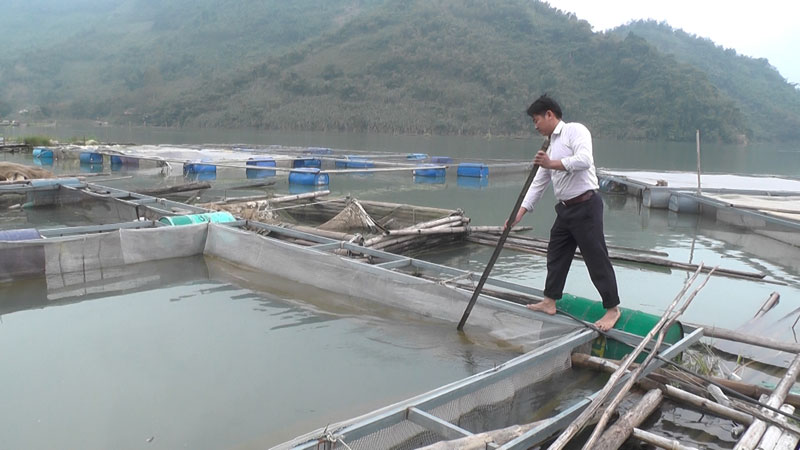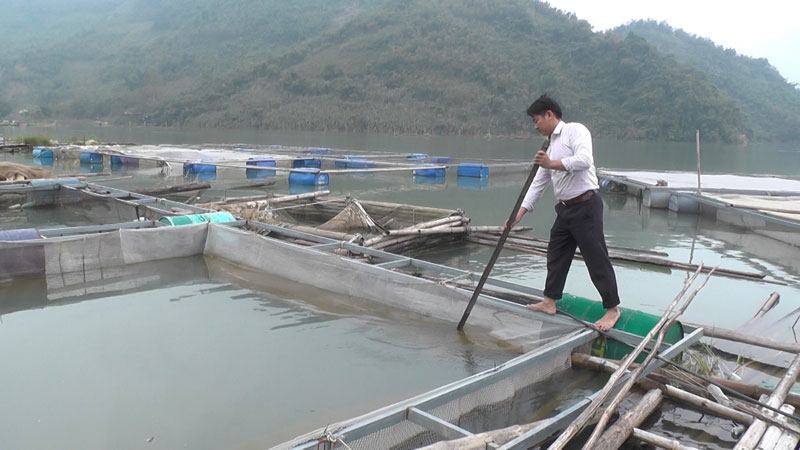
(HBO) - Five out of 10 hamlets of Vay Nua commune in Dan Bac district areas are located beside the Hoa Binh lake. Based on this natural advantage, local people select cage fish farming as a sustainable poverty reduction model, thus gradually increasing income, raising the living conditions and promoting the locality’s socio-economic development.

Cage fish farming has helped Xa Van Dang’s family in
Tham hamlet, Vay Nua commune (Da Bac district) earn over 100 million VND in
profit a year.
Local
farmers had raised fish in cages since before 2000 but in a spontaneous manner.
However, they faced many difficulties due to a lack of suitable small fish supply
and the instability of consumption. It was not until 2012 that the model began
to develop strongly.
Local statistics showed the commune currently has over 560 fish cages, raising mainly
Chien fish (Bagarius bagarius), Lang (Hemibagrus), Tram den (Mylopharyngodon
piceus),and Nganh (Cranoglanis
sinensis).
About 300 local households are joining the farming. Each fish cage generates 25-30
million VND in profit per year.
Suitable investment in this model can help local farmers earn 100 million VND/cage
per year. Some outstanding individuals such
Xa Van Dang and Bui Van Luan in Tham village; Dinh Cong Ut and Dinh Thi Hang in
Sang Trach hamlet can rake in between 100-200
million VND/year from the model.
Vay Nua has been provided 3.9 billion VND in support for
developing 389 fish cages. The local authority has coordinated with relevant departments
and sectors to efficiently use the support to improve productivity and quality
of products.
Many training courses have been organised to give technical direction in this
field to locals.
In addition, the commune’s authority was entrusted by the Social Policy Bank,
the Vietnam Bank for Agriculture and Rural Development Agribank for loans worth 30 billion VND. More
than 60 percent of local households have accessed this source of capital to
develop fish cage farming.
Bui Van Ky,
Chairman of the Vay Nua commune People’s Committee said thanks
to the effective development of fish cage farming, the per capita incomein the commune reached
17.2 million VND this year, and the rate of poor households
decreased to 41.08 percent,
according to statistics in 2018.
In
the coming time, the commune will continue to encourage households to expand the model and actively learn and apply
science and technology in the farming, he said.
Ky also
expressed the hope that departments and organizations will support the establishment of
cooperatives in the
commune towards promoting mutual support among local farmers in production and ensuringstable consumption for
products./.
According to data from the Hoa Binh Provincial Party Committee, the industrial production index for the first six months of 2025 is estimated to have increased by 20% compared to the same period last year. This marks the highest year-on-year growth rate for this period since 2020.
In the first six months of 2025, Hoa Binh province’s export turnover was estimated at 1.145 billion USD, marking an 18.11% increase compared to the same period in 2024. Import turnover was estimated at $ 804 million, a 17.15% increase, which helped the province maintain a positive trade balance.
The lives of the ethnic minority farmers in Tan Lac district have gradually improved thanks to the new directions in agricultural production. This is a testament to the collective strength fostered through the professional associations and groups implemented by various levels of the district’s Farmers’ Union.
With the motto the "product quality comes first,” after nearly one year of establishment and operation, Muong village’s Clean Food Agricultural and Commercial Cooperative, located in Cau Hamlet, Hung Son Commune (Kim Boi district), has launched reputable, high-quality agricultural products to the market that are well-received by consumers. The products such as Muong village’s pork sausage, salt-cured chicken, and salt-cured pork hocks have gradually carved out a place in the market and they are on the path to obtaining the OCOP certification.
In the past, the phrase "bumper harvest, rock-bottom prices" was a familiar refrain for Vietnamese farmers engaged in fragmented, small-scale agriculture. But today, a new spirit is emerging across rural areas of Hoa Binh province - one of collaboration, organisation, and collective economic models that provide a stable foundation for production.
Maintaining growing area codes and packing facility codes in accordance with regulations is a mandatory requirement for agricultural products to be eligible for export. Recently, the Department of Agriculture and Environment of Hoa Binh province has intensified technical supervision of designated farming areas and packing facilities to safeguard the "green passport" that enables its products to access international markets.



